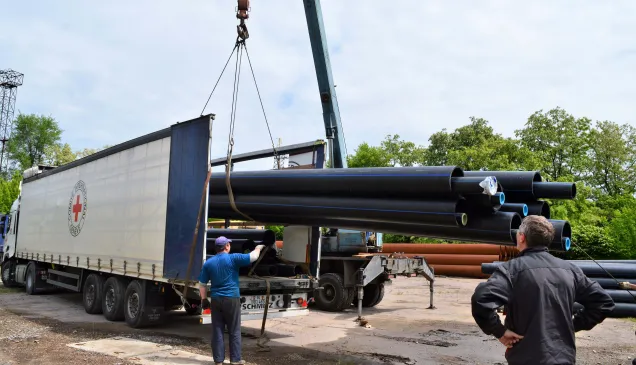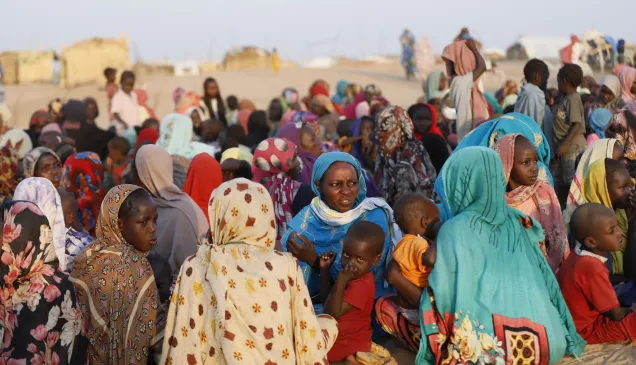26th session, Human Rights Council
The International Committee of the Red Cross (ICRC) presents its compliments to the Special Rapporteur on extrajudicial, summary or arbitrary executions. We are grateful to Mr Heyns for having consulted the ICRC in the elaboration of his report and more importantly for addressing the need to engage in domestic legal reform aimed at the adoption of comprehensive legal frameworks compliant with international human rights rules and standards on the use of force in law enforcement.
With a view to preventing and mitigating the humanitarian consequences of the use of force in the context of law enforcement, the ICRC, acting on the basis of its mandate under the Statutes of the Red Cross and Red Crescent Movement, has been promoting knowledge of and respect for international human rights law and humanitarian principles applicable to law enforcement situations, with special emphasis on the rules pertaining to the use of force and firearms, arrest, detention and assistance for those affected by the use of force. Rules and standards pertaining to law enforcement, which are mainly derived from the right to life, apply in all circumstances, including armed conflicts in which armed forces are increasingly expected to conduct not only combat operations against the adversary but also law enforcement operations in order to maintain or restore public security, law and order.
In its work with States and regional organizations, the ICRC has been promoting the adoption of strong, coherent and uniform legal frameworks on the use of force in law enforcement. Domestic legal frameworks should unmistakably define the measures to be taken before, during and after resorting to force. The adoption of rules and guidelines with clear and comprehensive standards and obligations governing the use of force also provides legal certainty for law enforcement officials as it prevents the use of illegal, unnecessary and/or disproportionate force.
However, the adoption of domestic legal frameworks is not sufficient to ensure respect for international rules and standards or protection for those who may be affected by excessive or otherwise arbitrary use of force. Adequate integration of the law, through proper training, education and equipping of law enforcement officials, is essential to protect the right to life, physical integrity and dignity of all human beings.
When engaging police and security forces on international rules and standards governing law enforcement operations, the ICRC mainly refers to the UN Code of Conduct for Law Enforcement Official and the UN Basic Principles on the Use of Force and Firearms by Law Enforcement Officials, which are essential tools for determining when the use of force can be applied in compliance with the right to life. In addition, the ICRC has developed a series of reference tools aiming at providing guidance on professional law enforcement practice. Recently, the ICRC also published an Expert Meeting Report on the delicate issue of the Use of Force in Armed Conflicts: Interplay between the Conduct of Hostilities and Law Enforcement Paradigms (November 2013).
The ICRC provides technical advice for police forces or armed forces when engaged in operations in support of law enforcement. It works to translate those norms into practical application measures that are to be reflected at policy, education and training levels. To that end the ICRC organizes advisory events at relevant hierarchical levels with a focus on promoting constructive dialogue so that it can convey its humanitarian concerns to both military and police or security forces.
Proper implementation of law enforcement standards at the domestic level should be accompanied by the incorporation of a comprehensive system of sanctions. Any excessive or otherwise arbitrary use of force has to be punished as a criminal offence and/or, depending on the seriousness of the case, with disciplinary measures. In both cases it is fundamental to ensure that superiors are made accountable and recourse to command responsibility should be ensured.
To conclude, in the ICRC's operational experience in and outside situations of armed conflict, the adoption of legal frameworks that restrict the use of force in accordance with international rules and standards must go hand in hand with the appropriate training and equipping of the military, police and security forces and with investigations followed by prosecution and sanction where appropriate in order to avoid excessive use of force in the context of law enforcement operations.
We therefore remain fully committed to support, in accordance with our mandate, principles and working modalities, the initiative of Mr Heyns, Special Rapporteur on extrajudicial, summary or arbitrary executions.



